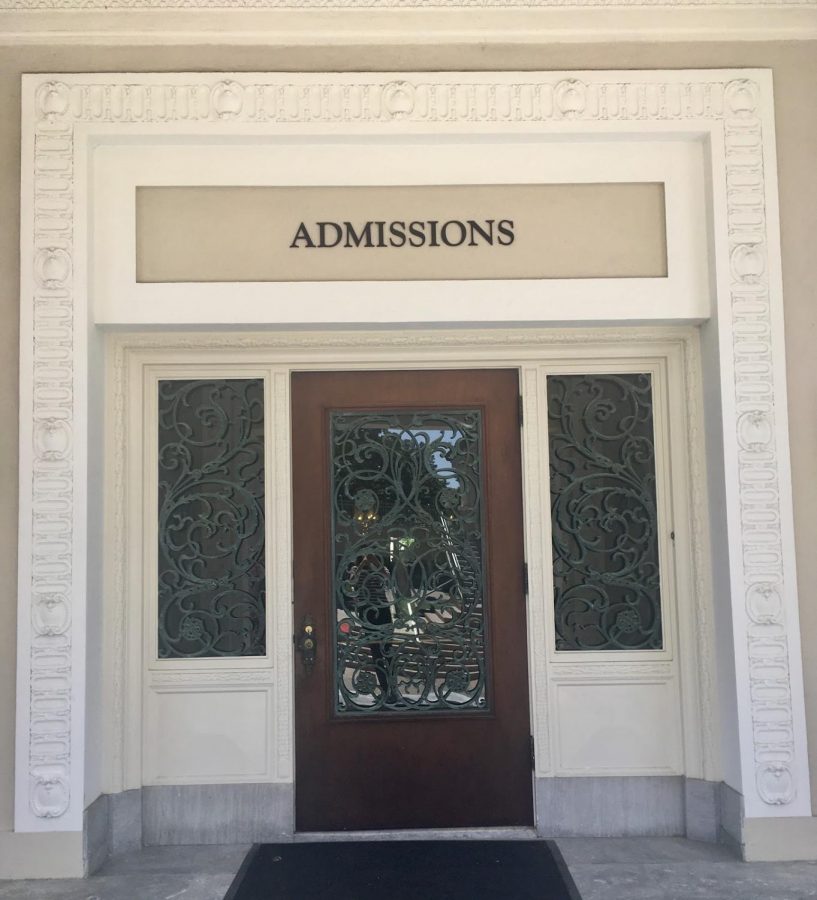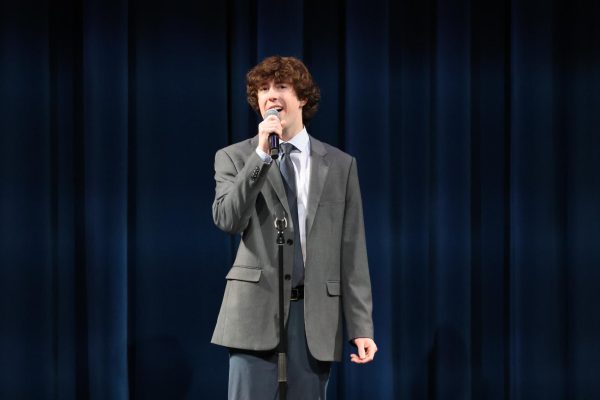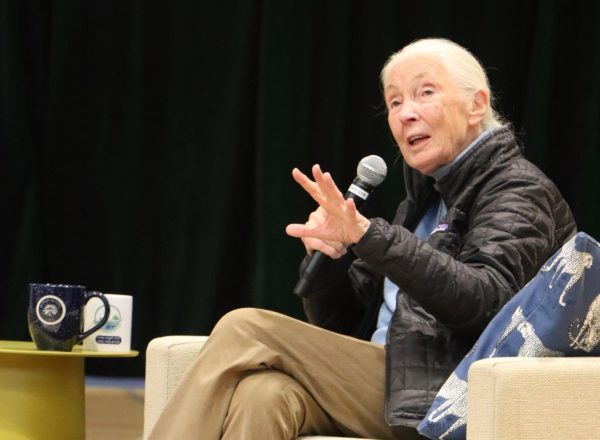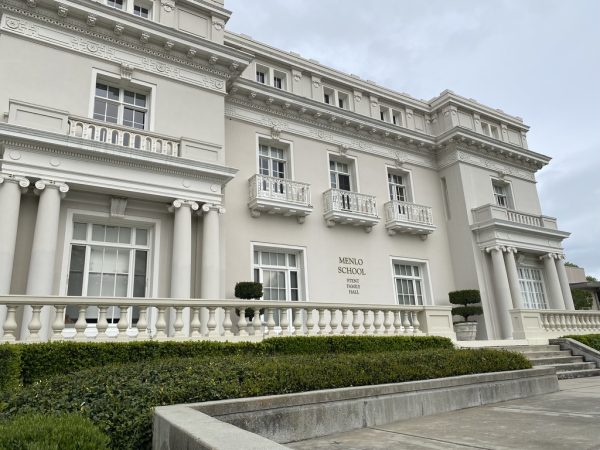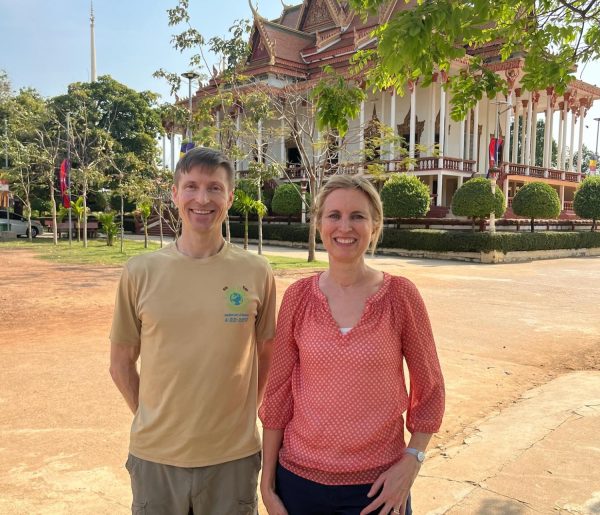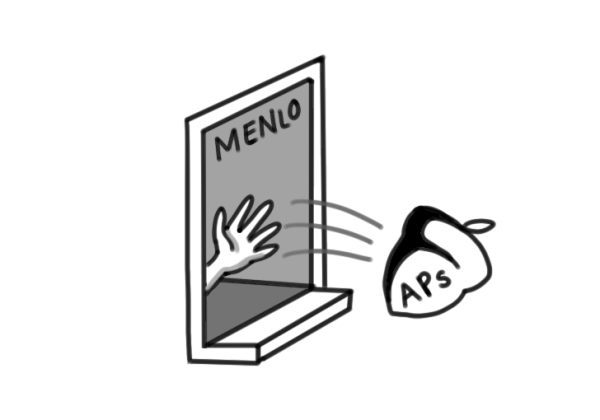In the Aftermath of the College Scandal: Comparing Menlo’s Admission Process to USC’s
Inside the Admissions Office, Bishop and the admissions committee decide whether an applicant is admitted or not. Staff Photo: Alexandra Viret
May 9, 2019
Although actress Lori Loughlin paid half a million dollars to illegally get her daughters into the University of Southern California (USC), other applicants, with guidance from their parents, have been employing legal yet controversial methods to give themselves an advantage when applying to colleges for decades.
Some college applicants hire tutors to write their admissions essay, instead of writing it on their own. “On the USC application […] the short answer [section] would be written like a teenager, and then the essay would be written like an adult,” former admission officer at USC and Menlo’s current Dean of Student Life Programs Cathy Chen said.“So you would just tell from the shift in tone […] that it had been overly edited by another voice.”
Some students applying to Menlo have been found to do the same, according to Director of Admissions and Financial Aid Beth Bishop; however, the admissions office also tries to obtain some form of writing that they are sure was written only by the applicant. “[W]e get authentic student writing through the essay on the ISEE or the SSAT and through the questionnaire that kids do on their [interview] day,” she said. The ISEE and the SSAT are standardized exams for students applying to independent schools.
Bishop acknowledges that applicants are often more careful when writing their heavily-edited online application when compared to writings done spontaneously. This makes it harder for admissions to distinguish whether the application is authentic student writing or not. “If you have your friend proofread it for you, or if you have your sibling proofread it, if you have a tutor proofread, if you have a parent proofread it—where does it become wrong?” Bishop said.
According to both Bishop and Chen, at both USC’s and Menlo’s admissions offices, admissions officers usually make a note that an application has been highly edited, but not much can be done as there is no definitive proof that the student’s application was unauthentic. Furthermore, Chen added that disparities in student’s applications that might indicate that they received outside help could go unnoticed, as many college admissions officers often have to read thousands of applications.
Although sports recruiting at Menlo, and other high schools, is strongly restricted by the Central Coast Section recruiting rules, coaches are legally allowed to notify the admissions office about athletes that stand out, giving them a slight edge. “They sometimes will let us know that they know of, say, a volleyball player that they’ve seen play at a tournament,” Bishop said.
For colleges, especially those with Division I sports programs, recruiting is much more prevalent, and being highly skilled in a sport presents a considerable advantage. “A certain football program for [a] DI school [could be] making that school a lot of money and getting it a lot of free advertising and marketing,” Chen said. “Because of this, [athletes are] held at a different standard, because they’re providing an institutional need for the school.”
Additionally, according to Chen, colleges are more open to accept donations, even if it means that students who are not necessarily as qualified get admitted. “[Colleges] need money to have […] the buildings and the facilities and the programs that keep the school interesting and relevant and attractive to students and families.”
On the contrary, applicants being admitted mainly because their families donated large sums to a school, are not commonplace at Menlo, according to Bishop. The admissions team and the development department are very separate, Bishop said, and when a family donates money to Menlo, admissions is not notified. “I’ve been approached by families who are applying, who say, ‘if you admit our kid we’ll […] give the school a big gift.’ And I have to explain to them, that’s not how it works,” Bishop said.
Although the use of more controversial methods to improve applications to schools are not as prevalent at Menlo compared to at USC, many students will most likely continue to partake in these unfair advantages to get into elite and exclusive schools. “Menlo is a place that is hard to get into and it feels good to get into here, because it was hard. And [students think], ‘that says something about who I am, right?’ So if we can feel differently about that, in some way, it would actually take some of the pressure off,” Chen said.


